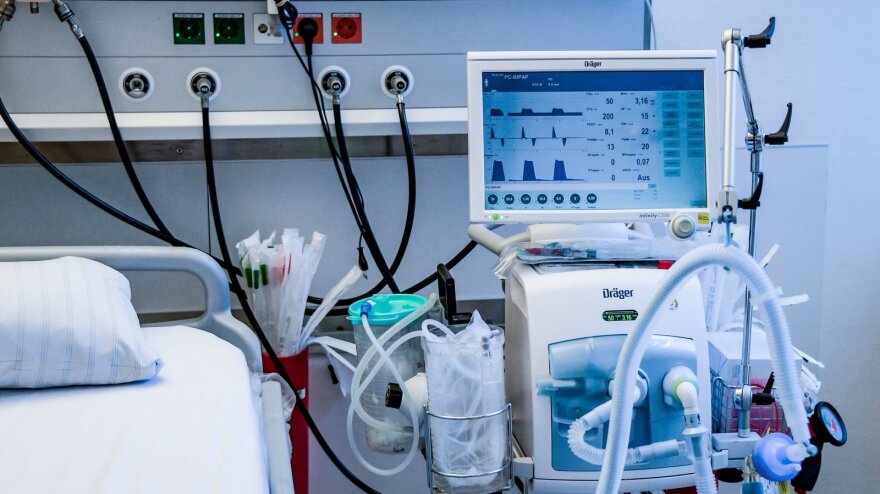As hospitals around the nation scramble to get more ventilators to help patients in respiratory distress from COVID-19, a professor at Southern Maine Community College has designed a device that could allow four patients to share the same ventilator.
Dan Abbott says he was approached by Maine Medical Center to design a piece that could connect the tubing. On Friday, he told Maine Calling's Jennifer Rooks that he used a special 3-D printer to create the five point splitter, dubbed the “starfish.”
Abbott: And so what they really wanted was a single, lightweight device that could plug in and disconnect the same way they do with the other ports on a ventilator. Then they had a nice smooth passage on the inside, and that could easily be used, and it was lightweight so it didn't hang down all the hoses. So I came up with a design that they liked, and then put one together and one of the respiratory therapists took it over and hooked it up to test it for air pressure. It held, I made another one, he put it together, and put together, essentially, a simulation with four patients using simulators for each of the patients. And the whole purpose of that at that stage was just to find out, will this thing hold air over a long period of time before they were going to move on to the other much more complex stuff. So really, all I did was design a very simple five port plumbing fixture that was designed specifically to work for the tubing that they have.
Rooks: The device is called the starfish, and it is designed to help ventilators in emergency rooms if this crisis gets even worse for hospitals.
Abbott: That's correct. It was the technicians that are or the therapists that are testing this who dubbed it the starfish. It just looks like a starfish because, of course, it's five ports, and they're equally distributed. So we got the design right out of nature. And again, it would have to be a dire, dire emergency. Nobody thinks this is a good way to use a ventilator. Clearly, it's just a question of being prepared. And I really admire the folks over there in the front line who said, 'let's just see if this is feasible and at least find out can we get a device of some kind and then we'll go from there.' But I've got high hopes for it, but I have no idea. I'm just waiting like everyone else to see what happens with the tests.
Rooks: Do you have any sense when it will be put to use?
Abbott: I don't. I'm hoping it never does, of course. The thing is, right now, Maine Medical Center is where the technicians happened to be, but really at this point, all I did was gave them a device that doesn't leak. At this point, they're doing testing that goes much more complex, goes well beyond anything that I'm involved with. And obviously, they have to be very cautious about giving the OK to something like this, particularly this particular procedure, which apparently is quite controversial. So I don't have any idea. They might decide after doing all the testing that they're just not going to do it. And then these devices are worthless. The reason I'm doing this, though, and the reason I was so urgent about it, is that if they decide they do need them in an emergency and then turned to me and say, 'can you give us some?' I just can't afford to have them wait 14 hours to get five of them. So I'm, right now, just printing stockpiles of the things. And if we throw them away, we throw them away. But our system president is all on board with it. And we're just really doing this. So if something really goes wrong, we'll have a supply of these things. And if they suddenly say, you know, 'I really do need those,' I can just give them a box instead of saying, 'I'll be back to you in two days.'
Ed note: interview has been edited for length and clarity.



